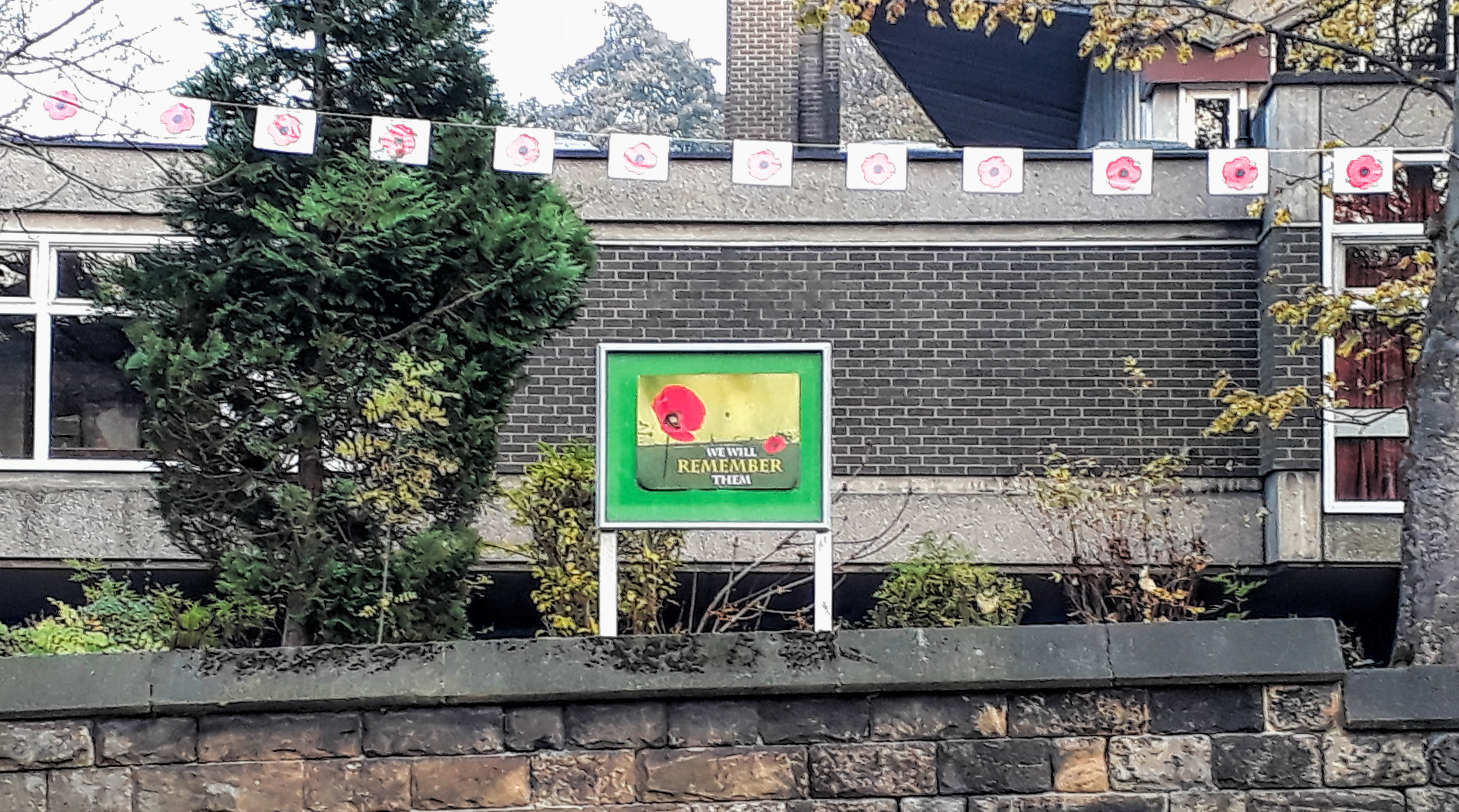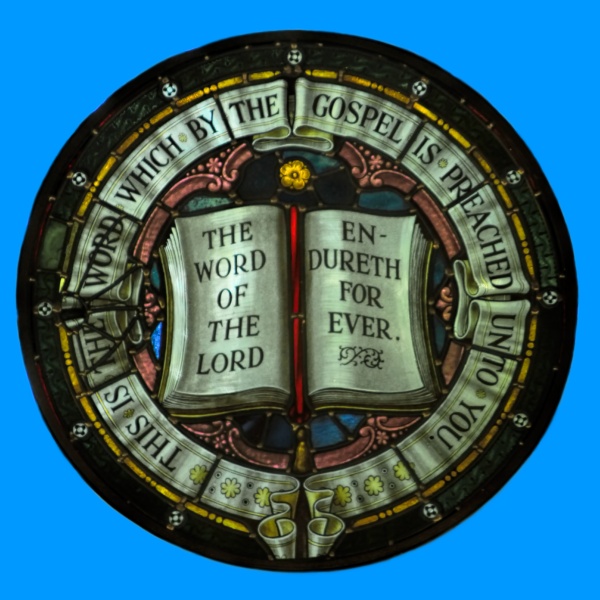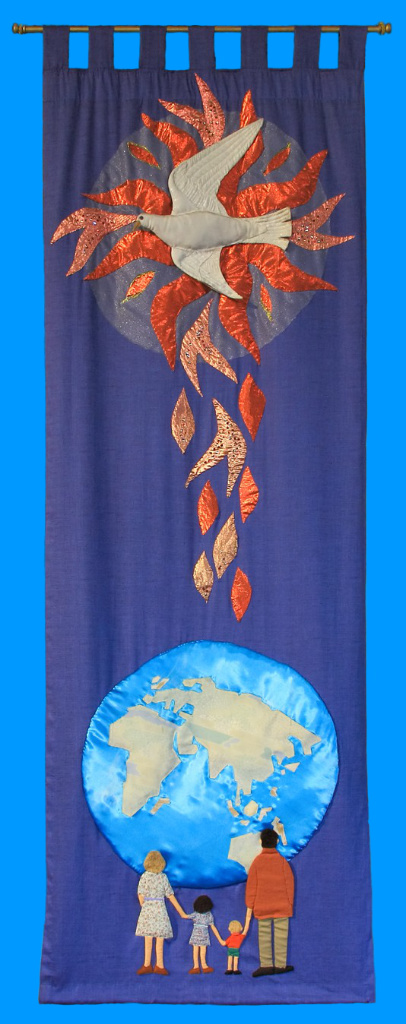
Music for this week’s service has been recorded at Headingley St Columba URC and, where it is not in the public domain, is used under the terms of our PRS LOML Licence LE-0020656
Order of Service
Organ prelude: Trumpet Tune – Marc-Antoine Charpentier (1634 – 1704). Arranged for organ by Bryan Hesford (1930 – 96)
Welcome
Call to Worship Psalm 46.1-2 (NIVUK)
‘God is our refuge and strength, an ever-present help in trouble. Therefore we will not fear, though the earth give way and the mountains fall into the heart of the sea’.
HYMN
Tune: St Anne – William Croft (1678 – 1727)
O God our help in ages past,
our hope for years to come,
our shelter from the stormy blast,
and our eternal home:
Under the shadow of thy throne
thy saints have dwelt secure;
sufficient is thine arm alone,
and our defence is sure.
Before the hills in order stood,
or earth received her frame;
from everlasting thou art God,
to endless years the same.
A thousand ages in thy sight
are like an evening gone;
short as the watch that ends the night
before the rising sun.
Time, like an ever-rolling stream,
bears all our years away;
they fly forgotten, as a dream
dies at the opening day.
Our God, our help in ages past,
our hope for years to come,
be thou our guard while troubles last,
and our eternal home.
Isaac Watts (1674-1748) altd.
Opening Prayers & Lord’s Prayer
Lord God almighty,
We come before you today where we are, not just to remember, but also to praise you, and to ask for your help in our lives and in our world. We praise you for who you are, the creator of the whole universe, the one above all things, who can work all things for good. You are the faithful and compassionate one. We praise you for your mercy and love, and for your promised presence with us. We remember that you made each one of us to be like you and blessed us with this rich and fruitful earth. You gave humankind responsibility for the good ordering and wellbeing of the world. And yet we have messed up, and we do so time and again. We confess that we are not always peaceful, or loving to those around us. We ask for your forgiveness. Help us to resolve to show your love to others, to forgive others as you have forgiven us, and to follow you, the prince of peace, in all that we do. Help us in our remembering today we pray. For your holy name’s sake, Amen.
We now join together in the words of the Lord’s Prayer . . .
Act of Remembrance
We now come to our act of Remembrance with the 2-minute silence. At home, you may like to stand as you’d do in Church, as you are able. If you’re not used to the silence, pray silently for those who have lost loved ones in war, and for those who work to bring peace around the world. The silence will end with the usual Binyon words, read to us by Ailsa Jarvis. We will all respond, ‘we will remember them.’
(Silence)
They shall grow not old, as we that are left grow old;
age shall not weary them, nor the years condemn.
At the going down of the sun and in the morning,
we will remember them.
We will remember them.
For the Fallen
Laurence Binyon (1869 – 1943)
National Anthem – God save our gracious Queen
Introduction to the first reading
In this reading the prophet develops the themes that have gone before, of God’s judgment on the people, set in the guise of a prayer which begins by exalting God, and then of God’s restoration of them, looking to a time in the future.
Reading – Isaiah 25: 4 – 9
Organ interlude: Chorale prelude O Mensch bewein dein’Sünde gross – J. S. Bach (1685 – 1750)
Introduction to the second reading
This second reading is very short, and is part of Paul’s instructions to the young pastor Timothy as he leads the Church. In these verses, we hear instruction on prayer.
Reading – 1 Timothy 2: 1 – 6
Sermon
The passage we read in Isaiah gives a wonderful picture, not just of what God has been to us, but also of what God will be. We can think of the new earth and new heavens of Revelation 21, and various parts of the prophets Ezekiel and Daniel. They are all pictures of what living in a peaceful place might be like, a world where peace shall reign.
In this passage in Isaiah, we hear of a feast of rich food, well-matured wines, the heavenly banquet we read of elsewhere, and which Jesus uses in parables of the Kingdom. Picture the plenty, the bountiful supply, a Kingdom where no-one will go without, and a time when God himself will wipe away every tear.
Those are all words of hope, which we hold on to, a time of peace which we look to and work towards. Although today is Remembrance Sunday, we can’t help but think of those words of hope also in our current context of the fight against Covid-19, and we can hold on to that as well.
Yet this passage doesn’t just speak of the hope of living in peace in the future. The beginning of the part we read, talks about how God is with us now, a refuge for the poor and needy, the one we can shelter in when things around us don’t go as planned, the one who can still the storm. It’s a picture of the strength of Christ for us now, helping us through those times, giving us peace in those times.
I’m sure we can all relate to that, difficult circumstances, parts of our lives that have been really hard. And then we’ve found refreshment in Christ going through them. There are always those instances when we’ve needed to renew our strength. Often when we come still before God’s presence, and give those things that burden us to him, we find peace for ourselves.
Within this passage we also see what is taken to be strong hints of the Messiah, the one in this passage who is to come. We have that picture of bountiful provision, of an age of peace to come, an age which is swept in by the Lord himself.
It is the Lord who will destroy the shroud, or sheet, that is covering over the nations. Scholars say the shroud refers to death itself. The passage then says, the Lord will swallow up death for ever. Those are familiar words we hear echoed by Paul in Romans—‘where O death is your victory, where O death is your sting?’
It’s that picture of what Jesus, God incarnate, has done on the cross, to overcome death forever, to bring about that world of peace. The final words of our reading are jubilant, that the Lord has brought salvation, ‘Surely this is our God; we trusted in him, and he saved us. This is the LORD, we trusted in him; let us rejoice and be glad in his salvation.’ (v9 NIVUK)
This picture in Isaiah then is of a world of peace brought in by the Messiah, by Jesus Christ. This is something we still yearn for in our world today.
To quote Mahatma Ghandi again this week, he said, “Peace is not something that you wish for. It is something that you make, something that you do, something that you are, something that you give away.”
That’s so true, isn’t it. We might wish for peace, or hope for the peace to come, yet we need to be active in making peace. At the pastorate where I ministered in London, we had a Pilots group, as you used to have here. One term, we focused on peace, on personal peace, community peace and world peace. Ghandi’s words are about personal peace, which can bring about community peace, and eventually, world peace.
In the other reading from 1 Timothy, Paul is charging the Churches to pray for all people, and specifically for kings and all those in authority. This is to pray for peace, to live in peace personally, but also for world peace.
In one sense, praying is active, even though we can’t necessarily see the results straight away. I read somewhere that Kingdom-wise, Hitler was ultimately overthrown by the prayers of thousands of people, and apartheid was toppled in South Africa. Our prayers today for various situations in our world, and for governments to change situations, even maybe about the US elections, are making a Kingdom difference, even if we can’t immediately see the results.
Prayer and action go together. So we come back to think of ourselves as living as people of peace. Peace is shown in what we are like as individuals, in how we relate to others, in how we resolve conflicts in our own lives. It’s how we mirror Jesus’ life. In essence, as people of the Kingdom, it’s how we witness to the peace of Christ, the peace that He brings to us. In Matthew’s Beatitudes we’re reminded that Jesus says, ‘Blessed are the peacemakers, for they will be called children of God.’ Peace is also one of the fruits of the Spirit the apostle Paul gives in Galatians.
It may feel, with all the conflicts that are going on the world today, that what we do in our small corner can’t really make a difference. But it does, simply because we’re called to live out the Kingdom. And if we’re faithful in that, God will use us, maybe not in what we can see happening, but in ways which are significant for God’s Kingdom to come in our world.
I’m reminded of the modern hymn, ‘Put peace into each other’s hands’, by Fred Kaan. The words remind us to treat peace like a treasure, to protect it like a candle-flame, to be gentle in all we do and say, and to share it with others. It reminds us that peace starts with us as individuals, which brings peace into our families, communities, and beyond. We are called to live that life. And we are called to pray for peace too: to pray for authorities the world over, that peace will come, that the Prince of Peace will reign, and that the vision of a world where there will be no more tears and no more death, will come to pass.
Amen.
HYMN
Tune: Rhuddlan – Welsh traditional; last verse arr. Noel Rawsthorne (1929 – 2019)
Judge eternal, throned in splendour,
Lord of lords and King of kings,
with thy living fire of judgement
purge this land of bitter things;
over all its wide dominion
spread the healing of thy wings.
Still the weary folk are pining
for the hour that brings release;
and the city’s crowded clangour
cries aloud for sin to cease;
and the homesteads and the woodlands
plead in silence for their peace.
Crown, O God, thine own endeavour;
cleave our darkness with thy sword;
feed the faithless and the hungry
with the richness of thy word;
cleanse the body of this nation
through the glory of the Lord.
H Scott Holland (1847-1918) altd
Prayers of Intercession
Gracious Lord God,
We pray today for the service men and women who have died in the violence of war, each one remembered by and known to God, both those from our own country and those of other countries.
May God give peace
The peace of Christ
We pray for those who love them in death as in life, offering the distress of their grief and the sadness of their loss.
May God give peace
The peace of Christ
We pray for all members of the armed forces today who are in danger, remembering family, friends and all who pray for their safety.
May God give peace
The peace of Christ
In our land, we pray for all those who have come out of the armed forces and find themselves living with a disability, destitution, homelessness, drug addiction, and broken by their memories.
May God give peace
The peace of Christ
We pray for all across the world whose lives are disfigured by war or terror, calling to mind in penitence the anger and hatreds of humanity.
May God give peace
The peace of Christ
We pray for peace-makers and peace-keepers, who seek to keep this world secure and free.
May God give peace
The peace of Christ
We pray for all who bear the burden and privilege of leadership, political, military and religious; asking for gifts of wisdom and resolve in the search for reconciliation and peace. In this time, we pray for our own government and for our royal family.
May God give peace
The peace of Christ
God of truth and justice, we hold before you those whose memory we cherish, and those whose names we will never know. Help us to lift our eyes above the torment of this broken world, and give us the grace to pray for those who wish us harm.
May God give peace
The peace of Christ
We think in this time in world history of all who are suffering and who are afraid, and all who are anxious about the future.
May God give peace
The peace of Christ
Help us to put our faith in your future; for you are the source of life, hope and peace, now and for ever,
Amen.
HYMN
Tune: Eventide – William H. Monk (1823 – 89)
Abide with me, fast falls the eventide;
the darkness deepens, Lord, with me abide;
when other helpers fail and comforts flee,
help of the helpless, O abide with me.
Swift to its close ebbs out life’s little day;
earth’s joys grow dim, its glories pass away;
change and decay in all around I see;
O thou who changest not, abide with me.
I need thy presence every passing hour;
what but thy grace can foil the tempter’s power?
Who like thyself my guide and stay can be?
Through cloud and sunshine, O abide with me.
I fear no foe, with thee at hand to bless;
ills have no weight, and tears no bitterness.
Where is death’s sting? Where, grave, thy victory?
I triumph still if thou abide with me.
Hold thou thy cross before my closing eyes;
shine through the gloom, and point me to the skies;
heaven’s morning breaks, and earth’s vain shadows flee;
in life, in death, O Lord, abide with me.
H. F. Lyte (1793 – 1847)
Blessing
In a world of conflict, be a beacon of hope.
Amid the strife, fight for justice, pray for peace, and walk in God’s ways.
And may the blessing of God almighty, Father, Son and Holy Spirit, be with us all, and those we love, now and always,
Amen.
Organ voluntary: Rondeau from ‘Abdelazar’ – Henry Purcell (1659 – 95). Arranged for organ by Bryan Hesford (1930 – 96)


